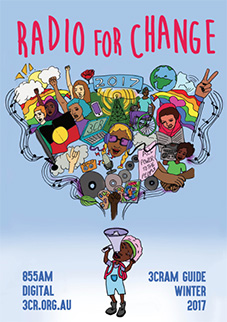
Radio For Change
Published May 2017
The CRAM Guide is made with the generous contributions of volunteer writers, photographers and 3CR programmers.
2017 CRAM Editors Juliet Fox, Aodhan Madden and the Projects Sub Committee
2017 Design and Layout Aysha Tufa
2017 Contributors
Lalitha Chelliah Spike Chiappalone Dianne Cohen Corey Green Kerri-Lee Harding Emma Hart Pat Khor Rachel Kirby John Langer Maryse Leonard Joe Malignaggi Viv Malo Hope Mathumbu James McKenzie Aran Mylvaganam Areej Nur Kelly Whitworth Ayaan Shirwa Michaela Stubbs Robbie Thorpe Sista Zai Zanda
3CR is proud to acknowledge the Wurundjeri people of the Kulin nation, traditional owners of the land from which we transmit people powered radio.
WARNING: Aboriginal and Torres Strait Islander readers are warned that the following pages contain names and images of people who have passed.
3CR Staff Management 2017
3CR Staff
Station Manager Rachel Kirby Program Coordinator Michaela Stubbs Volunteers and Training Coordinator Leanne McLean Office and Finance Coordinator Loretta O’Brien Current Affairs Coordinator Gabrielle Reade Projects Coordinator Juliet Fox Technical Coordinator Greg Segal Technical Assistant Riah Williams I.T Worker Luke Neeson Music Coordinator Paul Elliot
3CR Committee
Chairperson Pat Khor Vice Chairperson Helen Gwilliam Vice Chairperson Joe Malignaggi Secretary Therese Virtue Treasurer Perambalam Senthooran Directors Lalitha Chelliah Aoife Cooke Emma Hart John Langer Patricia Posterino
Station Report 2018
Author: Rachel Kirby, Station Manager
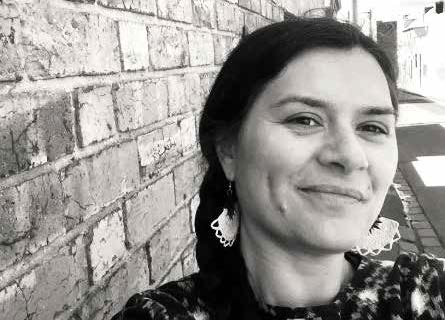
From the station’s test broadcast in 1975 to the present day, 3CR has been at the forefront of Melbourne progressive politics, providing the infrastructure of studios, microphones and training to volunteer programmers. Hundreds of people built our humble station, and hundreds continue to give it life and purpose.
The current political climate in Australia and globally is one of rising racist and pro-capitalist policies. Decisions that embolden the most regressive and conservative thinkers are creating a political and cultural climate with dire effects for many in our communities. But within this spreading conservatism there are always people who are prepared to speak back, to organise, and to rise to the challenges of our times. Many of those voices and people can be found here at 3CR.
'At the heart of everything, it is the people'
‘Radio for Change’ aims to capture this resistance and places 3CR in a central starring role—without 3CR, where do we hear progressive alternatives, where do we hear our communities speak for themselves, articulating their own struggles and solutions?
Within these pages you will find a slice of life at 3CR, people who volunteer their time offering you, our listeners, an opportunity to be inspired, challenged and engaged.
At 3CR, we know that representation—self.representation—matters. As you’ll read on page 5, a recent training project aimed to equip young Muslim women ‘with the skills to self-represent, thereby directly combatting the misrepresentation and invisibilisation they face’.
Self-representation is also at the heart of our Roominations show, produced and presented by people with a lived experience of homelessness. As programmer Spike Chiappalone says, ‘The strength and vitality of community radio is that it provides an authentic, unfiltered voice of those who experience marginalisation, alienation, social exclusion and social stigma’.
While the need for self-representation is at the heart of the Victorian ‘treaty process’, our First Nations shows also provide a critical historical perspective. You can read the words of broadcasters Robbie Thorpe and Viv Malo, along with those of guest Lidia Thorpe in the piece ‘Treaty now’. Their programs Fire First and Black Block continue to shed light on the ongoing injustices facing First Nations people across the country, along with the inherent contradictions appearing in the current treaty process.
Every day like so many community organisations our station faces increasing financial pressures amplified by the spread of privatisation, gentrification and commercialisation. Only with the support of our listeners are we buffered from these pressures and only with this support, can we look forward rather than constantly glancing at the bottom line.
Our annual Radiothon fundraiser is vital in seeing the station through another year and it’s you our people that are at the heart of our ability to stay radical, independent and alive. Please support this year’s Radiothon—‘3CR Radio for Change’
Organise, Mobilise, Broadcasting for Change
Author: James McKenzie, Chairperson (2009-2017)
The rise of right-wing populism presents opportunities and threats for 3CR.
The need to organise, mobilise and broadcast community issues has reached a critical point, especially since the election of the Trump ‘administration’ and its fascist policies and approaches, and the real potential for the election of copy-cat governments elsewhere.
It’s imperative that 3CR continues its activist hub approach to organise and broadcast progressive community, social justice and political stances to counteract right-wing politics and provide alternatives.
The election of the Trump government places the world in potentially dire and chaotic social, economic and military positions. The fragmentation of right-wing political parties in Australia, particularly the Coalition, presents an opportunity for the Left to provide cohesive, inclusive, progressive and transformative policies and alternatives.
Social, economic and political policy arenas are increasingly more complex and contested. People want information and forums that reflect their values and emotions, often at the expense of the facts. Community radio, with its focus on diversity and the voices and experiences of a plethora of communities and ordinary people, is a very effective medium for harnessing people’s concerns, issues and values and presenting them with factual and transformative information and ideas.
3CR has achieved extensive constitutional, policy, planning and industrial achievements over the last year and is in a very strong position.
The Community Radio Federation passed a new Constitution and Committee of Management (CoM) developed a five-year strategic plan and passed Community Engagement and Financial policies. These were requirements of the media regulator, the Australian Communications and Media Authority (ACMA). As a result of Federation’s and Committee’s work, the ACMA has given 3CR a broadcast license until 2020.
CoM articulated a vision for the station as part of the strategic planning process.
"3CR Community Radio provides a media space enabling progressive communities
to voice ideas and build their power to create social change"
Committee of Management also developed and passed new training policies for live-to-air and outside broadcasts to encompass and reflect the diversity of the 3CR Community. CoM, staff and the Media Entertainment and Arts Alliance signed off on a new Enterprise Bargaining Agreement in December.
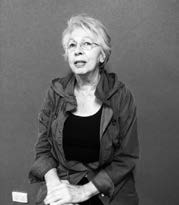
Welcome to the new Chairperson Patricia Khor
The station welcomes the appointment of Patricia Khor to the role of Chairperson in 2017. Pat first started at reception some 15 years ago, and is now the co-presenter of Talkback with Attitude together with Joe Toscano.
She has served on CoM for six years, including as Vice-Chairperson for the last four years. Pat’s passion is current affairs, and she’s excited to take the station into the next phase of ‘Radio for Change’, continuing our commitment to social change and giving a voice to marginalised communities.
Annual report available 3cr.org.au/whoweare
Muslim Women make noise
Author: Areej Nur, Women on the Line presenter/producer
‘Muslim women are experts in our communities and experts in ourselves’ – Idil Ali
Idil was one of the participants of a training project created in partnership with the Australian Muslim Women’s Centre for Human Rights (AMWCHR). Together with the AMWCHR, 3CR ran a week-long radio and podcasting program aimed at young Muslim women.
The AMWCHR is a woman-led and focused Muslim organisation and its young women’s programs centre around the themes of empowerment, self-awareness, human rights and feminism. The discussions often relate to media representation, as the experiences and bodies of Muslim women are on high rotation in the public eye.
Farhana, a participant of the training program says, ‘Muslim women are seen as the other and a minority.’ She also agrees they’re underrepresented in the media. Using radio as a platform for their voices, participants of the training program were able to define and affirm themselves and their own experiences.
‘I think it’s important for young Muslim women to have a voice so they can connect to other like-minded women,’ participant Anna said. These types of training programs are ultimately intended to equip communities with the skills to self-represent, thereby directly combatting the misrepresentation and invisibilisation they face. However, they’re also aimed to be social spaces where like-minded members of the community feel represented and validated within the group.
The training itself consisted of general technical radio and podcast training as well as a series of workshops on feminism, privilege and self-awareness facilitated by the AMWCHR. These workshops informed the more practical training and ensured the program did not simply ‘teach podcasting’. It took a holistic approach to media, designed to teach participants as consumers, subjects and now producers of media.
As a station, 3CR’s role was to provide young Muslim women who identified their keen interest in the media with the basic technical skills to create their own platforms and make their own media. By the end of the program, participants created podcasts about a range of topics including Muslim feminism, self-care and even a satirical podcast about what young Muslim women really think.
The group of participants came to the training with varying levels of media experience and varying ideas of what they wanted to get out of it, and Anna says, ‘I felt like I was able to just talk things through in a safe and open environment.’
The training course consisted of many conversations about media and storytelling and in the near future the young women are looking to expand their audio editing skills, create websites and record as much audio as possible.
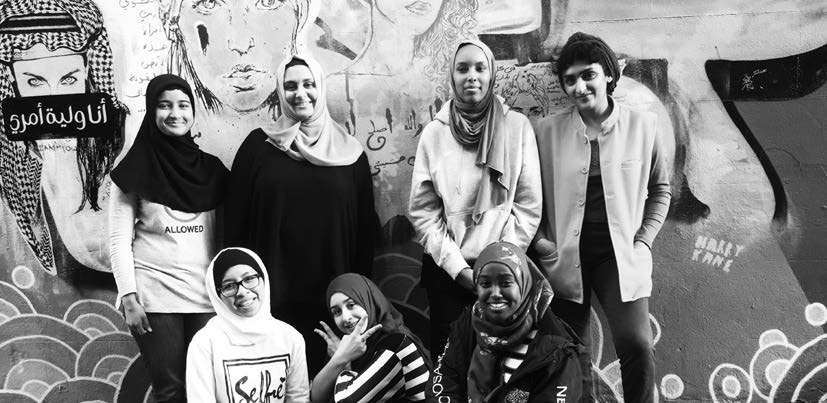
Participants Nayeema, Anna, Reem, Adeela, Farhana, Mariem and Idil in front of the mural on the side of the 3CR building. Photo by Areej Nur.
A Soapbox for the Homeless
Authors: Kelly Whitworth and Spike Chiappalone, Roominations presenters
The Roominations homelessness program, proudly celebrating 10 years on air in 2017, has come a long way since its humble, radical beginnings. Founded, in part, to prove wrong the assertion that ‘people who are homeless don’t have radios’—the last 10 years are testament to the show’s success in reaching its target audience.
Roominations is the only radio program that is produced and presented by people who either have, or are currently having, a lived experience of homelessness. The production team of Daz, Kelly, Spike and Tony provides weekly news, views, guests and analysis of issues in the housing and homelessness area.
In recent times, Roominations was a pivotal base for broadcasting the sounds and issues arising out of the 8-month long #bendigost public housing occupation-style protest in Collingwood. It also recently covered in depth the #nohomelessban campaign about the proposed introduction of Melbourne City Council by-law changes which would unfairly criminalise people experiencing homelessness in the CBD. Without Roominations and 3CR, news of these important community campaigns would not have reached the wide community base that it did and mobilise the community in support.
Spike says, ‘There is nothing sexy about homelessness. It can be a lonely, confusing and terrifying experience, as anyone who has experienced homelessness can attest to. It was during my experience of this turbulence that I discovered the oasis that is Roominations. The strength and vitality of community radio is that it provides an authentic, unfiltered voice of those who experience marginalisation, alienation, social exclusion and social stigma. These voices are heard only because in 1975 activists organised and were successful in getting up Australia’s first community-owned and community-controlled radio licence. Roominations and 3CR work to be truly democratic and representative of the community in which it resides.’
Kelly says that her favourite aspect of being a producer on 3CR is getting out into the community with a portable recorder and capturing the ‘voices of the street’. She says, ‘I love doing vox pops, getting the sounds and views of people who are experiencing homelessness and broadcasting them on the show. That’s the beauty of Roominations: it provides a space for people who ordinarily have their voices filtered through mainstream media to be heard raw, as they are. To me, that is incredibly powerful. It raises people’s self-esteem, lets them know that their voices are important, and, ultimately, is a powerful force for progressive social change.’
Daz believes Roominations gives him a purpose in life. He hopes the show helps people get out of homelessness by bringing attention to issues. He believes it is a ‘voice for the voiceless’.
Over the years Roominations has spoken to a wide variety of individuals, from those with a lived experience to those who work in the homelessness sector. These voices are valid and valuable contributions to our community and culture. Roominations provides those who have been overlooked, and in many cases disqualified, with the opportunity to participate in the social dialogue.
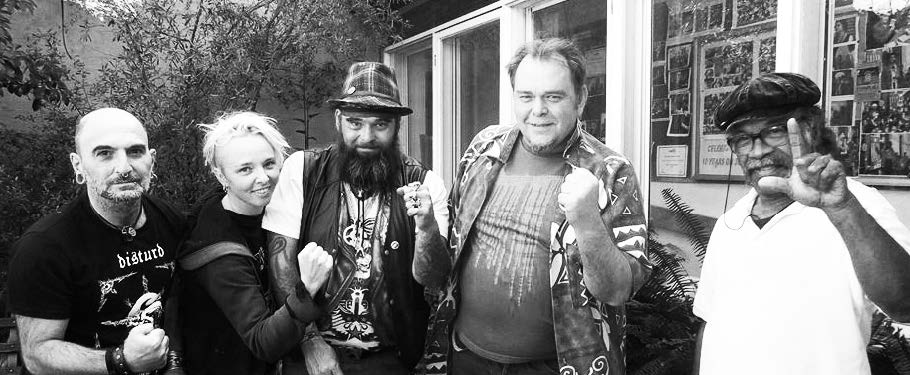
Programmers Spike, Kelly, Tony, Daz and Setariki in the 3CR courtyard.
LISTEN: Roominations Thursday 12-1pm
Saay Xaba
Author: Maryse Leonard, volunteer
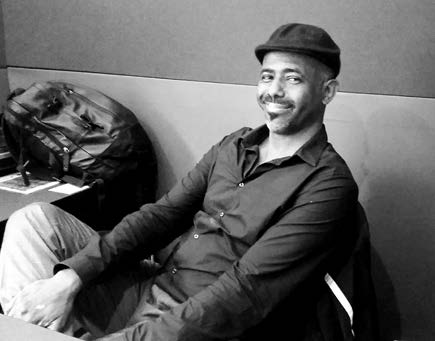
There is a rich and diverse calendar of events taking shape over the next couple of months. ‘During the Queen’s Birthday in June there is a Cultural Day where children are taught traditional songs and dance, to keep the culture, that’s very important.’
"You can’t hold onto your culture tight knit, you have to let other people know your culture because it’s how you network"
A week-long festival for the community begins on 10 July over in Ethiopia where singles can meet up with each other. It is a joyous celebration as the Ethiopian government will help pay for group weddings for those who cannot afford it. Parts of the festival will be broadcast live from Ethiopia and will include symposiums, soccer matches, culinary delights and a chance for families to connect. This event started in 1996 in the United States and has grown extensively so the Ethiopian government puts on a major celebration every five years.
Back in Melbourne the community focus is very much alive with a Saturday school offered for kids ranging from ages 3 to 18 years old. Children are given guidance and support in higher education and it is also an opportunity for them to give back - a ‘pay it forward’ system for when they graduate. ‘It has been running for 25 years and we have two doctors now.’
The vision of growing wider and reaching more children is ever expanding with a possibility of an exchange program. ‘It has been a dream of mine. We bought a block of land and once we are settled, our plan is for everyone to come and enjoy, we will be inviting professional singers, anyone that can contribute like historians,’ says Mohammed. There is an open invitation for everyone to discover and learn. ‘You can’t hold onto your culture tight knit, you have to let other people know your culture because it’s how you network.’
Learning and creating has been a major focus with language software being developed for written and spoken word to translate from English to Ethiopian and vice versa. The Victorian State Library initially developed this project back in 2009 but now it’s on Facebook and an app for Android users has been developed. ‘People back home, because they don’t understand English, our software converts to Ethiopian language when they read emails.’
Is there a message for our listeners? ‘Of course! Aspire before you expire! The most important thing is don’t wait for other people, do what you need to do.’
LISTEN: Saay Xaba Friday 8-9pm
IWD2017 live breakfast: Women #BeBoldForChange
Ayaan Shirwa, Tuesday Breakfast Show presenter/producer
Dianne Cohen, Wednesday Breakfast Show presenter/producer
Hope Mathumbu, Tuesday Breakfast Show presenter/producer
Lalitha Chelliah, Friday (Green Left Weekly) Breakfast Show presenter/ producer
On International Women’s Day 2017 (IWD2017), 3CR’s Tuesday, Wednesday and Friday Breakfast presenters celebrated over 40 years of fabulous feminism by hosting a special live breakfast show. With the help of 3CR staff and volunteers, the presenters organised an amazing show in which community members were invited to be part of a live audience. The morning kicked off with a breakfast in the courtyard, followed by a live show which featured an in-studio DJ and panel line-up of diverse women speaking about their lives, work and feminist philosophies.
The IWD2017 theme #BeBoldforChange was epitomised by the unique experiences, feminist work and practices of the panel members. DJ Whiskey Houston’s live music throughout the show was the icing on the cake for this extraordinary program. Whiskey has made an indelible mark on Melbourne’s queer party scene by igniting and fostering communities through club nights that have come to represent safe spaces for Melbourne’s LGBTQI+ communities. Whiskey advocates, through the grassroots movement LISTEN, for better treatment and representation of marginalised people in the music industry.
The first discussion of the morning was with Melbourne-based DJ, event curator and radio presenter, MzRizk. DJ MzRizk’s many projects are a distinct blend of music knowledge, creative diversity and cultural and community engagement. IWD2017 live breakfast presenter, Lalitha Chelliah was impressed by MzRizk’s experiences saying, ‘DJ MzRizk was exciting to listen to as she shared her journey in the music scene of being a woman and how she has been able [to] not just survive but make gains in the highly male dominated [and] commercialised world of music.’
The second speaker for the morning was Margarita Windisch, a community services and social work teacher at Victoria University. Margarita is also a member of Socialist Alliance, and a long-term feminist and social justice campaigner with a very keen interest in climate change and its disproportionate impact on vulnerable population groups. Margarita’s advocacy and community development work is an inspiration for many young women in Melbourne’s community, including IWD2017 live breakfast presenter, Hope Mathumbu, ‘Margarita’s passion and drive are incomparable. In times when I am feeling despondent about the state of the world, she is someone whose work and philosophies I turn to for re-energising and mobilising my advocacy spirit.’
The third conversation was with Pila Darling and Idil Ali. Pila Darling is an opinionated, queer, non.binary, trans being. Pila’s work responds to societal reactions to their existence and is a tool to examine, process and unlearn trauma, seeking to expose joy in an otherwise hostile environment. Idil Ali is a passionate advocate for African and Muslim communities. Idil works at Drummond Street Services and is a member of RISE: Refugees, Survivors and Ex-detainees and Youth Activist Leader with Plan International.
"everyone should band together to give voice and power to those in need"
Pila and Idil had an amazing conversation with the live breakfast team, discussing their work, as well as the need and importance of intersectional feminism. Presenter Lalitha Chelliah shared her thoughts on their discussion saying, ‘As a young female leader Idil Ali expressed the view that, as a woman of colour, she experiences prejudice more keenly but is courageously fighting back. Pila Darling spoke on the fundamental issue of safety for transgender people and expressed a sadness about how their space is still missing.’ IWD2017 live breakfast presenter Di Cohen commented, ‘I strongly support Idil’s views that whether or not you consider yourself part of a minority group, everyone should band together to give voice and power to those in need of respect and recognition. There is so much that can be done towards social justice and just because you might not be affected personally, why would you sit on your hands?’
The final conversation for the morning happened over the phone with Paola Balla, a Wemba-Wemba and Gunditjmara woman of Italian and Chinese heritage. Paola discussed her work as an artist, curator, speaker, educator and cultural producer and how her practice is driven by social justice, addressing impacts of colonial trauma (particularly on women and children).
IWD2017 presenter Ayaan Shirwa found that the live breakfast special really captured why she joined 3CR as a programmer on Tuesday Breakfast, ‘I joined 3CR because of my friend Areej Nur. I was impressed—and continue to be impressed—by the content she produces for Women on the Line. I may not have heard of 3CR if it wasn’t for her. Her boldness is what attracted me to the station. It’s this same boldness that the panellists and programmers brought to the IWD broadcast. It was our diverse beliefs and commitment to social justice and equity for women, transwomen and non-binary people that brought us together. Judging by the positive feedback, the public agree that 3CR is Radio for Change!’
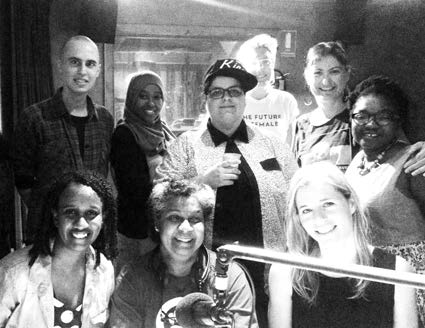

Above: Presenters and guests for IWD 2017 in Studio 3. Back row L-R Pila, Idil, MzRizk, Whiskey, Margarita, Hope. Front row L-R Ayaan, Lalitha, Dianne. Below: Tuesday Breakfast presenter Hope Mathumbu.
Music for Change or for the Soul?
Author: Joe Malignaggi, co-presenter on Music Matters and Music Sans Frontieres

Image: Azz Band live in Studio 1 on Music Sans Frontieres.
Is music for change or for the soul? There’s a question for you, and I’m sure you’ve heard it before. So what about the answer? Both!
3CR plays a very significant role in the local music scene, while also supporting artists who use music as part of their activism. Just take a look at 3CR’s 40th anniversary book Radical Radio for proof. In this way, the station’s music-based activism plays its part within a long history of global struggle through the use of song.
The Chilean dictatorship murdered the musician and activist Victor Para because of the influence his music had on the people of Chile. Music was a form of communication in the jails during the Apartheid regime of South Africa, a time when Afrikaans was forced onto the entire population. Inmates would sing in their local language, like Xhosa, but include ‘messages’ in the songs so they could continue to be part of the Freedom Struggle. In Australia, many songs have been used as anthems at rallies to keep the energy and spirits high. A self-confessed music hater, Dr Joe Toscano has even relented and allowed guests on his conversation program Radical Australia the opportunity to perform a song if they are a musician and activist. He has a saying about the longevity of activism, ‘Better to be a comet that burns longer and returns, than a star that explodes’.
Melbourne is recognised as a very significant city for live music. There is now no argument that it is the arts and music capital of Australia! Community radio provides a valuable opportunity for independent artists to reach a wider audience, and to use their songs as a call for action. 3CR’s Studio 1, the ‘performance space’ Studio 3, and even the station’s courtyard have hosted some intimate moments over the years and still do. This is where the airwaves give voice to artists from a myriad of cultural backgrounds to perform in language. There are personal songs, stories of homelands and journeys, of coming to Australia, as well as songs about what life is like here.
Becoming a music broadcaster/programmer gives you the opportunity to either play tunes from the genre you like, or to invite artists that you may have seen at a gig or busking onto your program to do a live set. Not only is this mutually beneficial for artist and broadcaster alike, but it also produces some extraordinary moments. During an episode of Music Sans Frontieres, in the middle of the day, Saharnaz Kia, a young Iranian girl involved in the project ‘Scattered People’, came in and although she was nervous, she did an extraordinary accapella version of ‘Tooye yek divare sangi’ by Googoosh, a very popular song and artist from Iran. When staff and other volunteers at the station, including listeners react, you know there’s been a moment. Initiatives like ‘The Real Songwriters of Melbourne’, set up by the enthusiastic Jena Marino to give artists the opportunity to share their story and their music using social media, have also performed live to air— again providing listeners with many of those special ‘moments’. For the performing artist, child soldier survivor from South Sudan, Emmanuel Jal, music was never considered part of his pathway, but as it turned out his humanity and story-telling was the ‘soul’ necessary for change to be a possibility.
The space afforded by 3CR to support independent music is very generous. Young singer-songwriters, new, unsigned or established artists that are independent of the constraints of multinational record labels, come into the studios and provide some colourful radio. Such performances also give the opportunity for technical training in audio engineering for volunteers who otherwise would find it difficult to get a chance in the mainstream. Live to-air training at the station has a long history, and continues to prioritise women, transgender, gender diverse and non-binary participants adding yet another level to the station’s music-based activism. The open space provided by community radio enables colourful, creative collaborations motivating others to get involved in the cause. Clearly music at 3CR is very much for both change and the soul— ‘change’, as musicians and programmers join forces to give a voice to social justice campaigns through the power of voice; and ‘soul’, as listeners and station volunteers alike are inspired by those intimate and insightful on-air ‘moments’.
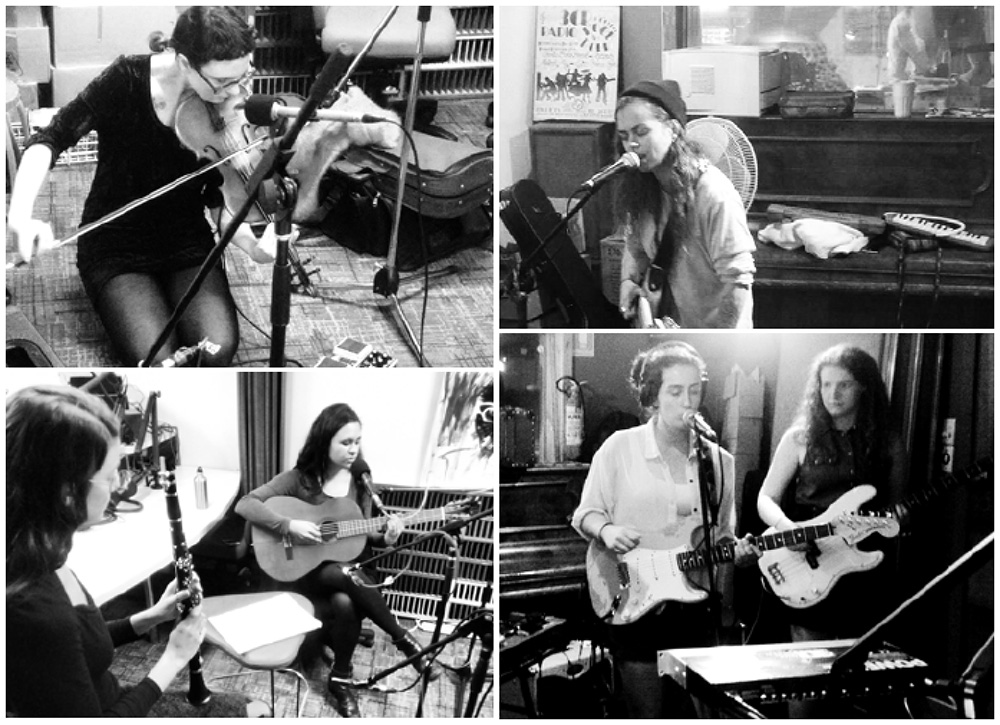
Above left: Motte on Music Matters.
Above right: Tash Sultana on Music Matters.
Below left: Lucy Roleff and Rosalind Hall on Music Matters.
Below right: Bec Goring and The Elwood Winters on Music Matters.
LISTEN: Music Matters Friday 12-2pm
Black Gold radio
Authors: Kerri-Lee Harding, Black Gold series producer; Corey Green, Black Gold assistant producer
Kerri-Lee Harding, Black Gold series producer
Black Gold is a 5-part radio series produced with the deadly fine support of the Community Broadcasting Foundation. In the series we feature a range of rarely heard black sounds, offering listeners a valuable insight into 3CR’s past recordings and all the exciting and unique archival audio captured long before the digital age.
Throughout the Black Gold series we take the audience on a deadly solid radio archive journey from the 1970s right through to the present day with a look at how Aboriginal and Torres Strait Islander broadcasters at 3CR covered some incredible community events and significant political struggles. We take listeners to a land rights meeting in 1978, celebrate the life of broadcaster Lisa Bellear, and hear about the successes of the campaign to save Northlands Secondary College. We also reflect back on the anti-Bicentenary actions in 1988, and cover the ongoing struggle for Sovereignty and Treaty.
"We take listeners to a land rights meeting in 1978"
Episode 1 features an Aboriginal land rights meeting in 1978 in Melbourne with assistance of presenters Robbie Thorpe and Viv Malo. Together we take the audience inside the meeting in Melbourne, where we hear from people who have since passed and from people who are still active in Aboriginal Affairs and the struggle today, including Jack Davis, Margaret Briggs, Marcia Langton, Mark Noble and Joyce Hall.
Episode 2 is ‘Let’s Agitate in ‘88’ with presenter Kelli Mac. 1988 was the anniversary of 200 years of British invasion and the Australian government decided it was a good time to get out the flags, snags, and whip up some patriotism. Far from celebrating, Aboriginal and Torres Strait Islanders made it their mission to show the world the true meaning of the anniversary: 200 years of brutal genocide, and a proud history of resistance. As always, 3CR was in the thick of the action. John Harding, 3CR’s Aboriginal project officer at the time, took a crew up to Sydney to broadcast the huge protests against the official celebrations and the first fleet re-enactment, and in Melbourne the 3CR broadcasters were broadcasting a First Fleet de-enactment at the Fitzroy pool.
Episode 3 covers the ‘The Fight to Save Northland Secondary College’, and we’re joined by presenter Kutcha Edwards. In the early 1990s the Kennett government shutdown Northland Secondary College but the decision was fought all the way to the Supreme Court. In this program we bring you the recollections of former Koori Educators Deidre Baksh and Lyn Thorpe along with former student Alister Thorpe.
In Episode 4 we celebrate the life of 3CR broadcaster Lisa Bellear. With presenter Viv Malo, this episode digs deep to find a beautiful collection of Lisa’s poetry readings, audio excerpts from Nelson Mandela’s visit in 1990, and Lisa Bellear’s past interviews from 3CR program Women on the Line.
The final in the series, is ‘Sovereignty and Treaty’ with presenter Robbie Thorpe. In this show you’ll hear the sounds and audio of the 3CR live outside broadcast held on the day the Queen of Australia visited the Exhibition Buildings in Carlton to officially open the ‘Stolenwealth Games’, along with audio excerpts of the Stolenwealth Games Black GST protest with broadcasters Gilla MacGuiness, Robbie Thorpe and Clare Land. You’ll also hear sounds of unique, deadly voices expressing how local Aboriginal community members and others were really feeling about Sovereignty and Treaty right here in Victoria.
I was fortunate to work on Black Gold with assistant producer Corey Green. We spent a solid amount of time researching for the absolute best sounds and digging deep into our very rich and diverse historical audio archive of Aboriginal and Torres Strait Islander radio broadcasts.
Corey Green, Black Gold assistant producer
I’m grateful for the opportunity I was given to work on the Black Gold series. I learnt a lot. A special day was spent with Kutcha Edwards, going out to Aunt Deidre Baksh’s house and hearing her first hand stories, and the perspective of Alister Thorpe. I think Black Gold is an important project because 3CR is the holder of important activist history. Knowing our history is important because we learn what’s possible, why things are the way they are, and what has and hasn’t worked in the fight to create a better world. ordinary people“ can change history
One story I covered was the fight to save Northland Secondary College. In late 1992 the Kennett ” government announced the closure of 55 public schools including Northlands. Taking the lead of Koori educators, a campaign group formed made up of staff, students and the community. Together they successfully ran a small school, a community campaign, and a court case ... and they won. In the words of Gary Foley, who was a 3CR broadcaster, father of a Northlands student, and President of the school council, ‘The important lesson that I hope that everybody in this room and all the kids who go to Northlands have learnt is that ordinary people can change history, and ordinary people can make history’. It’s important to know that a small group of dedicated people with a commitment to culture can shape the world—even against powerful interests.
I learnt similar lessons from the episode about the bicentenary protests. This fight was about the story that people told each other about the invasion of Australia, and so it related to people’s everyday interactions on this stolen land. The Australian government planned for the bicentenary to be a chance to bolster the white colonial story, but people came together in creative ways to speak truth to power. The combination of the truth and the strength people drew from coming together was more powerful than millions of dollars and the endless supply of Aussie flags. 3CR Radio for Change! The power of ordinary people, the power of culture, the power of the truth and strength found in unity. We live these things every day at 3CR, but sometimes in the moment it’s hard to know how much of an effect you are having. That’s why it’s important to have projects like Black Gold that remind us of the impact of those who have come before us.

Above: Recording for 3CR at Campaign Sovereignty, Stolenwealth Games, 2006. Photo Jacqui Brown.

Above: Flat Fleet anti-bicentenary broadcast from the Fitzroy Pool, 1988. L-R Susan Duffy (the Queen), Hamish Trumble (Captain Arthur Phillip).
LISTEN: 3cr.org.au/blackgold
A decolonial act
Authors: Sista Zai Zanda, Pan Afrikan Poets Café
On Sunday 28 May, in celebration of Africa Day, The Pan Afrikan Poets Café partnered with 3CR to broadcast a matinee of poetry and performance. Supported by the City of Yarra Community Grants Program, The Pan Afrikan Poets Café Africa Day Broadcast showcased emerging artists who identify as African and First Nations people. In the lead up to the broadcast of the live performance event, these storytellers attended The Pan Afrikan Poets Café Open Art Labs—professional development sessions in creative writing and an introduction to radio workshop.
The Pan Afrikan Poets Café is the home of new, cutting-edge and classic African literature. Founded in 2015, by host and curator Sista Zai Zanda, the Pan Afrikan Poets Café has spoiled audiences in Melbourne and Sydney with over 100 performances by Afrikan and First Nations performers and three of the events have been broadcast live on community radio. The guiding vision of these events is to profile and celebrate Africa’s rich literary legacy and its diverse storytelling traditions while paying respect and showing love to First Nations peoples. Since the early 1900s, African literature and storytelling has played a fundamental part in African liberation and decolonial thinking.
The ability to tell one’s own story in one’s own words—to ‘define myself for myself’, as Audre Lorde wrote—is a decolonial act. As we confront the violence of media misrepresentation, telling our stories on our own terms is an act of speaking truth to power. Given the historical erasure of our voices and stories, telling our own stories on our own terms radically subverts the dominant discourse. For this reason, it makes sense that we partner with 3CR Radical Radio for The Pan Afrikan Poets Café Africa Day Broadcast. ‘Africa Day’ was previously called ‘Africa Freedom Day’ and ‘Africa Liberation Day’ and so it is fitting that 3CR Radical Radio broadcast poetry, story and song that speaks truth back to power in the spirit of defining ourselves for ourselves as the twenty-first century Africans and First Nations peoples for whom freedom and liberation is also
a matter of decolonising minds and centering the Global South.
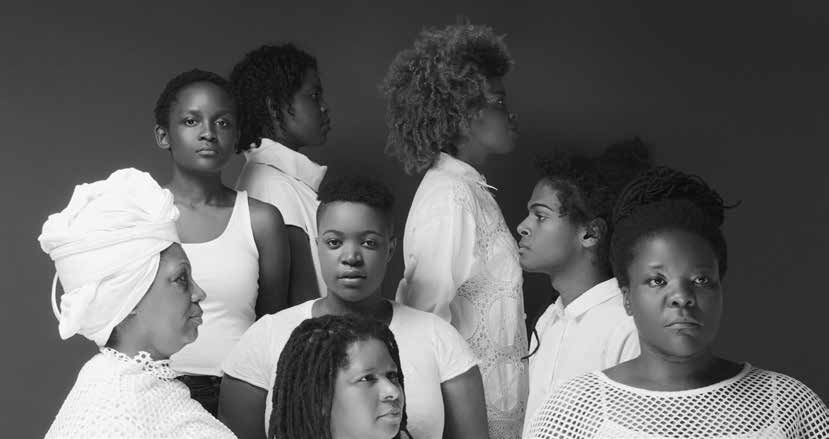
Afrika Speaks Back artists. Back Row (L-R, profile) Elizabeth Etta, Sha Gaze. Back Row (forward) Chido.
Middle Row (L-R) Bella Universe, Ntombi Moyo, Christopher J Walker.
Front Row: (L-R) Brownsugababe, Sista Zai Zanda.
Produced by Ntombi Moyo
Photographed by Ashlyn Farenden at The Photo Studio Australia.
JOIN: www.facebook.com/papoets
CONTACT: papoetscafe@gmail.com
Sudanese voices, Nile Show
Author: Emma Hart, volunteer
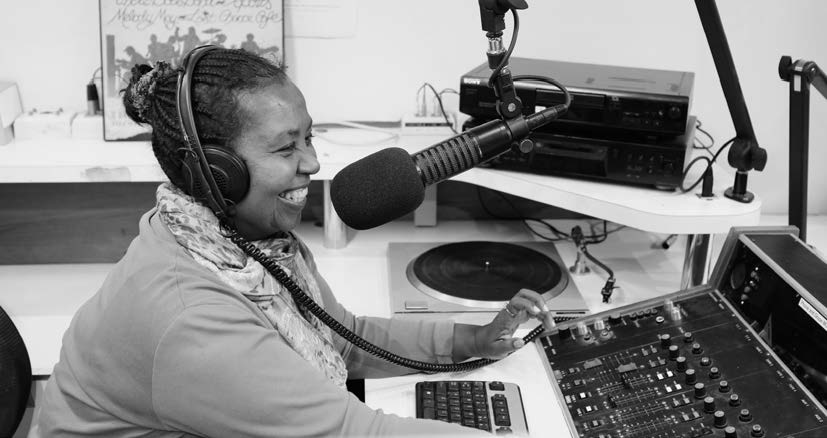
Image: Nile Show presenter Aziza Hussein.
Nile Show producer and presenter Aziza Hussein began her time on air at 3CR in late 2015 on the Monday Breakfast Show. Just over a year later, Nile Show has arrived as a new addition to the 3CR grid featuring the voices of Sudanese women living in Melbourne speaking about the issues affecting their communities in Arabic and English.
‘The idea of the Nile Show started partially because I’m a journalist and I always try to listen out for the issues that are not spoken about, rather than the issues people are willing to be open about,’ says Aziza. Meeting and speaking with women living in the Sudanese community in Footscray, Aziza found that there were many issues which needed to be discussed. ‘These issues related to these Sudanese women who are migrants and have come to a new society, but are careful when it comes to integrating with other communities in Melbourne,’ says Aziza.
Two key goals of the new show are increasing the representation of Sudanese voices in the Melbourne media landscape, and helping to educate the younger generation about Sudanese culture are. Describing guests on the show, Aziza says ‘Most of them have been here for more than ten years and they want to share their experiences of living in a different country and how they have made their success if they are working or running their own business. We share the idea of helping the first generation who are born here, or came here asyoung children, and we want them to know more about their Sudanese culture.’
Factors such as language barriers in a migrant context and different Sudanese communities living in diaspora also form part of the content of the show. ‘There are many complicated issues,’ says Aziza, ‘so the idea of having a program to discuss this came naturally.’
Having completed graduate studies in community radio in Sudan, Aziza wants the Nile Show to facilitate greater media access for Sudanese women. Moving forward with the show, Aziza says
‘I hope that my community will have a greater understanding of the role of the media, and of 3CR to help their voices be heard. 3CR is the station for voices that are not listened to, so I hope they can understand this and make positive steps.’
Community radio provides a crucial entry point for communities usually excluded from the media landscape. ‘I hope I can say this with full meaning, how much 3CR has given me,’ says Aziza. ‘I came to 3CR as a volunteer and just one year later I am doing my own show, 30 minutes every week to the Sudanese community, so I cannot even just say thank you, it’s more than that.’
What's in a name …
Author John Langer Communication Mixdown Co-presenter/producer
Communication Mixdown, that’s what we decided to call the show. Jen Martin and myself are the co- presenters. Bit of a mouthful for radio, we were told, but we stuck with it, and the show’s been powering along since November 2016.
Mixdown. The dictionary says it’s a term used by musicians and sound technicians and it ‘comes from the idea that you have many bits of audio spread across many different tracks when recording, but ultimately you’ll need to combine it all into a format that a consumer can use.’ And that’s our modus operandi—many bits spread across commentary, analysis, speculation, and research that we ‘mix down’ into a theme-focused show with interesting and timely interview-based content.
The term communication is harder to pin down. When we get asked about the show and then tell people that it deals with communication, they respond by saying, ‘But, isn’t that everything?’ Well, yes and no.
Back in 1987, French philosopher and cultural critic Jean Baudrillard published a book called The Ecstasy of Communication, and in it he argued that unlike previous times, our immersion in the world, the unfolding of meaning, and the building-blocks of our subjectivity are all increasingly a consequence of ceaseless and myriad modes of communication. This onslaught of information from all angles, at all times, engulfs and saturates us—inducing a state of ‘fascination and giddiness’, a type of ‘ecstasy’.
So, yes, communication is everything, and now thirty years on, Baudrillard’s pre-social media-smartphone- selfie prognostications seem more relevant than
ever. The twenty-first century, so far anyway, is turning out to be the century of communication. But that’s not the end of the story. Communication within culture, as part of everyday life, doesn’t just
happen freely. It’s lodged and articulated inside and around structures of power and privilege. The ‘already everywhere’ of contemporary communication needs location in the social, the political and the economic, and that’s where Communication Mixdown offers its programming approach: Whose voices are heard or ignored? Who benefits as the ecstasy takes hold? How are messages and technologies produced, used and abused?
As it turned out, the show kicked off just after the Trump election win—an auspicious and scarifying historical moment. Fake news, alternative facts, post-truth politics were some of the issues we tackled first, trying to make connections with the rising tide of the populist Right here in Australia. Since then we’ve covered considerable ground— communicating climate change, the changing role of superhero identity, the use of the f-word during street rallies, codes of communication in English classes for refugees, memory and the death of rock stars, the psychology of trolling, globalisation and the Australian advertising industry, social media and performance crime.
If there’s a foundational premise, it might start this way: the show casts a critical eye on the myriad ways in which we communicate with each other in our interconnected, multi-media platformed world. Each week we ‘mix down’ the who, the where, the how and the why of particular communication events, interactions, messages, trends and technologies, to then consider: what are the impacts and consequences?
LISTEN: Communication Mixdown Thursday 6-6.30pm
Interview with Michaela Stubbs
Author: Emma Hart, volunteer
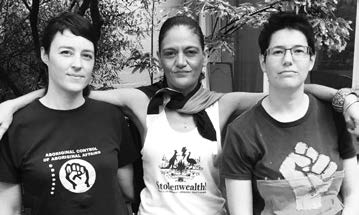
How did you get involved in community radio?
Thankfully my older sister introduced me to PBS and later Triple R and that got me through my teenage years, and I’m still a regular listener to both stations. My first contact with 3CR was when I joined what was then called the Anti-Uranium collective at Friends of the Earth in 2001, so I started listening to the Radioactive Show here and there along with other current affairs programs.
In 2004 I became campaigns coordinator for the Nuclear Free Collective at Friends of the Earth and then I had to start making media myself. My first interview on 3CR was about food irradiation for breakfast radio and I was very nervous but grateful 3CR gave me a chance to go on air and get some experience speaking in the media.
In 2013 the Radioactive Show were looking for some new team members, and I was back in Melbourne, so I did the 3CR training course which was so exciting and joined the show.
How are you finding being Program Coordinator?
It’s been a really exciting time in my life. It’s been great to learn more, to listen to more of the programs, and to meet the people behind the
voices on shows I’ve been listening to for years. It has really been the challenge that I was looking for, and
3CR is a fantastic organisation to work for. There’s a really long history and some people have been here for a long time and I want to be respectful of that
as well.
Is there a particular show or project you’re excited about at the moment?
There are a few new shows starting which is really exciting. We’ve got Blaknoise Radio, and Kerri-Lee Harding has just recently joined the Earth Matters team as well, so it’s great to have her on board. There’s Kornucopia which is an early Saturday morning music show with Karen Neville, and there are a few more music and sound shows by women
What do you enjoy most about your role at the station?
Just working with such an amazing group of people! The station is full of interesting people doing really great work in the world. It’s a really challenging time at the moment but it’s great to hear from a diverse range of people working in really different areas, with a common care for people and the environment, all wanting to create change for the better.
L-R Program Coordinator Michaela Stubbs with presenters Kerri-Lee Harding and Corey Green.
Treaty Now
Programmers Viv Malo, Robbie Thorpe and guest Lidia Thorpe.
There are around 55,000 Aboriginal Victorians. In2017 the Victorian government is undertaking a ‘treaty process’ with the Aboriginal people of this state. Fire First, Black Block and many other programs continue to cover this ongoing process, and to provide a critical, historical perspective to the current negotiations.
The following is from a discussion with programmers Viv Malo, Robbie Thorpe and guest Lidia Thorpe.
Lidia Thorpe:
What is treaty? Treaty is an end to the war, an end to our suffering and a chance for two sovereigns to sit down and negotiate a settlement. A settlement also acknowledges what’s happened to our people over the last two hundred plus years, and looks at reparations—and reparations are about how you can negotiate terms that almost put our people back to the way they were and give us the opportunity to do that in whichever way that looks. In terms of language, culture, land, and the status of our elders.
Our elders are extremely important to these negotiations. The government appointed leaders are not giving our elders the status they should have, that is, their authority as clan leaders, leaders of
their country. Even though some appointed leaders, or self-appointed leaders, say that they have the authority of their elders to speak, that still doesn’t give them the right to speak as authorised elders.
I want to hear from authorised elders of country, I don’t want to hear from appointed or self-appointed leaders.
Robbie Thorpe:
How come we’re still talking about a representative process here? My law is my elders, it’s always the way it’s been in this country. What sort of treaty are they talking about? I see the state government as a colony of Britain without any proper consent or permission. Why are they running this process? I’d like for them to demonstrate good intent before we go any further in this process called treaty. Because up until this point of time there’s been no good intention. So we can’t be talking about a treaty process. It’s not a treaty process. It’s got to have international scrutiny otherwise we’re just asking these criminals to determine the outcomes of the crimes that they’ve committed.
You might remember I worked on a campaign (with Marjorie Thorpe) called the Black GST, which has two letters before the T for Treaty. The first is Genocide,
to resolve issues around genocide, the other is Sovereignty, to acknowledge the law of the land. Only after these two points can we get to the point of treaty.
Lidia Thorpe:
We have 300 clans that need to be acknowledged and given reparations in this state. But there are only over 100 left surviving because of the genocide that has occurred.
Our position is that our clans need the opportunity to talk amongst themselves, they need to be resourced to be able to come together. We need to be able to have free and informed prior consent before we enter into any kind of dialogue about a treaty, or any kind of settlement. It needs to come from the clans. This state talks about a harmonious
aboriginal community. We’ve never been that, and we probably never will be that. But we are certainly strong as family clan groups and that’s where the dialogue needs to happen.
Empowering our clans on country will close the so- called gap that they are throwing billions of dollars into, and it would enable our families to strengthen themselves so much that we won’t have our people going to jail, or our children being taken away. We’ll be practising and learning our language again, we’ll be looking after and living off country, which is what heals us.
Viv Malo:
I respect that. What I love about Victoria is that despite being the frontline of genocide, the crimes and the depth of trauma, we’re still here. We’ve survived. We’re still here. It’s magic.
We should get a fire—take it out of the hands of the oppressor here. Call a meeting, we don’t need money to light a fire. We’ve got all the people, that’s what I see. In my little dream mind, that’s where the power comes from.
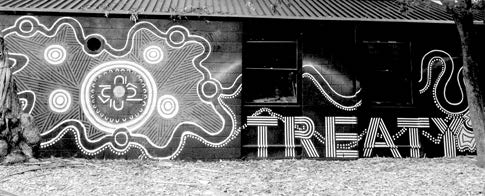
Image: Mural on the Yarra Youth Centre, Fitzroy.
Vale Trevor Grant 1951-2017
Author: Aran Mylvaganam, Tamil Voice and Tamil Manifest presenter
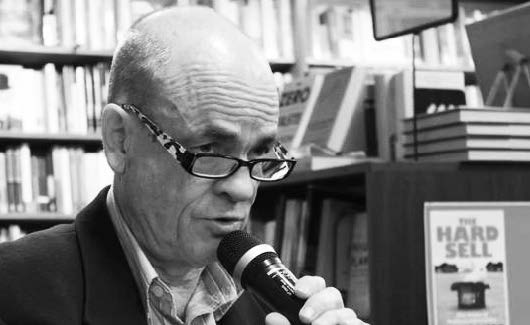
We have lost a friend, comrade and fighter for social justice.
Trevor Grant, who died on 5 March 2017 after battling mesothelioma, was best known as an accomplished journalist. He wrote for many publications in a career spanning 40 years. A former colleague, the Herald Sun’s John Anderson, described him as ‘one of Australia’s finest sportswriters of his time’.
And he was more than that; he was one of the finest people you could know.
I first met Trevor in 2012, at 3CR. He was undertaking programmers’ training in anticipation of hosting a new show, What’s the $core Sport? Trevor was a sports enthusiast, an avid golfer and a member of the Collingwood Football Club to the end. But he cringed at the profiteering so frequently visible at the highest levels of professional sport. He believed that human values, and the lives of athletes, too often were sacrificed on the altar of success—and, ultimately, the altar of profit.
Trevor’s world view had been shaped by his father, who was a member of the Communist Party. ‘Accumulation of wealth on one end’, Trevor often 20 said, ‘is equal to accumulation of misery on the other end’. He grew more radical with age, rather than more conservative. In retirement, most settle down and smell the roses; Trevor joined the socialists and paid dues to the CFMEU.
"Trevor and Bill Deller... along with others, founded a new organisation, Friends of Refugees, to handle the support from the community"
The Australian government’s treatment of refugees he found particularly detestable. He dedicated himself to the fight for refugee rights, regularly visiting the Broadmeadows detention centre and
becoming involved in Melbourne’s Tamil community. He was tireless in the work of drawing greater attention to the plight of Tamil Eelam, and became spokesperson for the Tamil Refugee Council.
In late 2012, Trevor floated the idea of a boycott campaign against the Sri Lankan cricket team. I was sceptical. Two years earlier, I had tried this avenue of public relations. I felt that 20 of us standing outside the MCG as tens of thousands walked right by us to watch the game did not make for particularly effective campaigning.
But Trevor told us about his media and sporting connections; he had networks, he said. It wasn’t long before we were making the front pages of The Age and The Sydney Morning Herald. Support started coming in from various organisations and individuals. Tamils in the diaspora—still reeling from the Rajapaksa regime’s brutalities in 2009 and the international community’s ongoing support for the Sri Lankan government—all of a sudden were full of hope.
Trevor built on this work, highlighting the plight of individual refugees as the Department of Immigration deported hundreds of Tamils back to danger in Sri Lanka. In early 2013, he led the Tamil Freedom Ride to Adelaide. It was a great example of how, despite being few in number, you can still have an effective campaign. His journalist friends had always poked fun at his short stature, but Trevor knew the art of punching above your weight.
He was always involved in the hands-on work, writing press releases, organising protests, making speeches, visiting people here and overseas and founding Refugee Radio, again at 3CR.
In 2013, refugees released into the community were being denied settlement support. We found people in houses around the city sleeping on floors. A dozen refugees in Mill Park were surviving on biscuits because they couldn’t afford a trip to the supermarket. Trevor would drive an old van around town, dropping off furniture. We found a woman, Hanel Akbari, and her husband Luhru, refugees from Iran, sleeping on the floor of a rental property in the south-east. Hanel was seven months pregnant. Trevor bought her a bed, baby items and a pram. Again he used his media contacts to draw attention to the situation. This led to the Tamil Refugee Council being flooded with donations. Trevor and Bill Deller, a well-known trade unionist and activist, along with others, founded a new organisation, Friends of Refugees, to handle the support from the community and help refugees with their welfare needs.
Trevor met a Tamil refugee in Sydney who had a USB stick containing more than 700 photos documenting the genocide being carried out in Tamil Eelam. This led to the book Sri Lanka’s Secrets: How the Rajapaksa Regime gets away with murder. While in hospital, Trevor told me that he ‘nearly fell off the chair’ when researching the work.
Trevor’s contributions to the refugee rights campaign in Australia are too numerous to document. But his activism was not confined to this area. For many years, he took part in the run for Palestine. He contributed to the campaign for West Papuan self-determination. Trevor was heartbroken by the treatment of Aboriginal people, and buoyed by the growth in recent years of Invasion Day protests, led by the Warriors of Aboriginal Resistance. He was passionate about workers’ rights and gave me ideas about how to organise workplaces in my role as an organiser for the Finance Sector Union. ‘Aran, how many people did you recruit today?’, he frequently asked.
"he loved talking to his daughter about politics. Ultimately, he yearned for revolution"
Late last year, Trevor told a friend, ‘I accept that I am dying so I can go on living’. He never threw in the towel. In his final days, he loved talking to his daughter about politics. Ultimately, he yearned for revolution.
The last time I saw Trevor, he was happy. I bought fruit, picked up his laundry and laid it out. He said he had a month left to live. As I was walking out the door, headed for Geneva to continue the advocacy work of which he was so vital a part, he asked, ‘When will I see you next?’
‘Soon’, I said. But the month he estimated turned out to be days.
Trevor was the most important person in my life, someone who opened my eyes to the root causes of oppression and how to fight them. We had known each other less than three years when he travelled to Chennai, Tamil Nadu, to be best man at my wedding in January 2015.
He loved his children Caroline and Matthew and his grandson Oliver, who is just four months old. They have lost a father and grandfather. I have lost a great friend and comrade.
And the cause for a better world has lost one of its true champions.
This article first appeared on redflag.org.au
Programming Updates
New programs
Blaknoise Radio Thursday 2-3pm
Join Blak Betty each week serving up a deadly fine offering of all things BLAK as we explore BLAK Australia and everything fabulous it has on offer.
Communication Mixdown Thursday 6-6.30pm
This show casts a critical eye on the myriad ways in which we communicate with each other in our increasingly interconnected, multi-media platform world.
Intersections Sunday 5.30-6pm
Local and global intersectional feminisms in action. Building feminist solidarity across race, gender, class, sexuality and ability.
Kornucopia Saturday 1-3am
Karen Neville presents a showcase of new alternative Australian music. Kornucopia is a platform for musicians to promote their gigs, tours, new releases, plus live-to-air interviews and performances.
Nile Show Monday 6.30-7pm
Sudanese women’s show featuring current affairs, interviews, and music, in Arabic and English.
Seeking Redemption Monday 1-2pm
From an inmates perspective, Fuddy and Mumbles talk about social issues affecting our community,
with a focus on aboriginal incarceration and sharing stories about the struggles of being accepted back into the community.
Rompiendo Silencios Sunday 5-5.30pm
History, customs and traditions from the Cuban archipelago. Voices from Cuba and Australia,
‘Breaking Silences’: a radio magazine with much more than music.
Shindig! Wednesday 12pm-1am
Historical music program focused on the 1960s era, and current music featuring 1960s influenced sounds.
Bluetomorrowz Sunday 12-1am
Autobiographic, geographic, journalistic radio decollage portal to the sonic personified dream states of the city and surrounds. Also featuring discussion, research and music involving intersectional sound art and women in tech.
Returning programs
Turkish Women’s Program Tuesday 9.30-10pm
Covering local and international information on community and current affairs, including Turkish community announcements, Turkish art and music.
Departing Shows
We said farewell to the following programs: Femme Freestyle, Shiftegan, Arada and Tak Radio. Thanks to all their presenters for the great programming.
Still to come in 2017
NAIDOC Week Beyond the Bars Prison Broadcasts: 3-7 July 2017
Beyond the Bars connects Aboriginal and Torres Strait Islander prisoners to the wider community and is a unique radio event that gives voice to the experience of inmates in Victorian prisons.
Awards
In 2016 3CR won a Community Broadcasting Association of Australia’s award for the Most Innovative Outside Broadcast or Special Event Broadcast for the series of live broadcasts from our
‘If People Powered Radio: 40 Years of 3CR’ exhibition at Gertrude Contemporary.
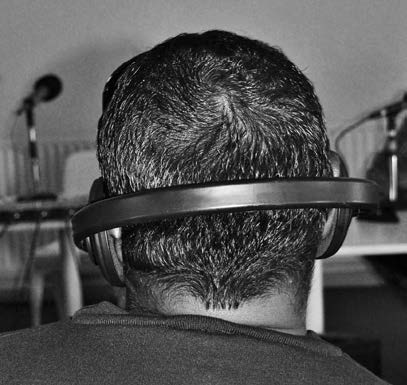 Beyond the Bars 2017 - NAIDOC Week, July 3-7, 2017
Beyond the Bars 2017 - NAIDOC Week, July 3-7, 2017

Connecting Aboriginal and Torres Strait Islander prisoners to the wider community in a remarkable radio event that gives voice to the experience of inmates serving time in Victorian prisons.
3CR’s live prison broadcasts
Monday 3 July 11-2pm - Dame Phyllis Frost Centre, Deer Park
Tuesday 4 July 11-2pm - Barwon Prison, Lara
Wednesday 5 July 12-2pm - Fulham Correctional Centre, near Sale
Wednesday 5 July 2-4pm - Loddon Prison, Castlemaine
Thursday 6 July 12-3pm - Port Phillip Prison, Laverton
Friday 7 July 11-2pm - Marngoneet Correctional Centre, Lara
Special Broadcasts
40 Days of Radical Radio: October 10 - Saturday 19 November 2016
Tunnerminnerwait Maulboyheener: 20 January 2017
This year marked 175 years since the execution of the two Freedom Fighters: Tunnerminnerwait and Maulboyheenner at a site on corner of Franklin and Victoria Streets. 3CR broadcast live from the public ceremony
LIVE SHOW: Tunnerminnerwait Maulboyheener
Eureka Rebellion: 3 December 2016
A live broadcast from the Eureka Park dawn service continued a long tradition of reclaiming our radical history.
LIVE SHOW Eureka Rebellion
Disability Day: 3 December 2016
Access All Areas! 12 hours of radical radio by, for and about people with disability. This year we focused on activists and performers in the City of Yarra who are fighting for accessible and equal communities alongside music, current affairs and documentaries.
LISTEN: 3cr.org.au/disabilityday2016
Summer Programming: December 2016 - January 2017
Whilst some of the regular programmers took their annual break, we brought you a range of documentaries, live-to-air performances, music, current affairs and special interest programs. You can find podcasts of some of these, such as Girls Rock!, Nile Show (Arabic) and A Rambling Beurologists Dream.
Invasion Day: 26 January 2017
Treaty Now!, our Invasion Day Broadcast, featured 5 hours of special programming from 11- 4 pm with live crosses to rallies and actions all around the country. New programmers Kerri-Lee Harding, Fuddy and Mumbles spoke to activists around the country including a cross to the Rally in Melbourne and Robbie Thorpe reporting from the Aboriginal Tent Embassy in Canberra.
LISTEN: 3cr.org.au/invasionday2017
International Women’s Day: 8 March 2017
Across 24 hours of women’s programming, we had 30 programs scheduled with women taking over regular programs of the day alongside content created especially for the day.
LISTEN: 3cr.org.au/iwd2017
Radical Radio: Celebrating 40 Years of 3CR
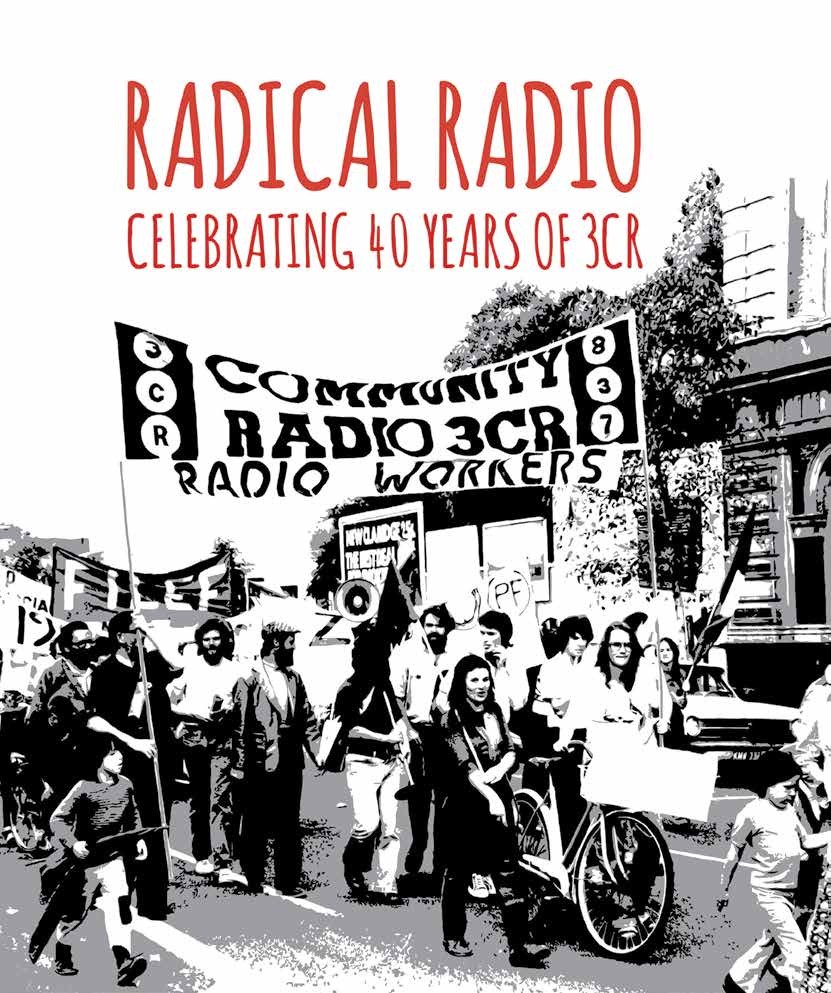
Radical Radio: Celebrating 40 Years of 3CR tells the story of 3CR’s contribution to Australian cultural and political life. When 3CR Community Radio hit Melbourne’s airwaves in 1976 it was Australia’s first community-owned and community-run grassroots radio station.
Outspoken and independent, the station still gives voice to issues that would otherwise go unheard, and to people striving for political and social justice.
A collective and collaborative writing project, Radical Radio celebrates these ongoing achievements, and highlights the diversity and dynamism of the programs and people that over 40 years have won 3CR its place in our hearts and on our radio dials.
BOOK SALES
$49.50 + postage
21 Smith Street, Fitzroy
03 9419 8377 (business hours)
